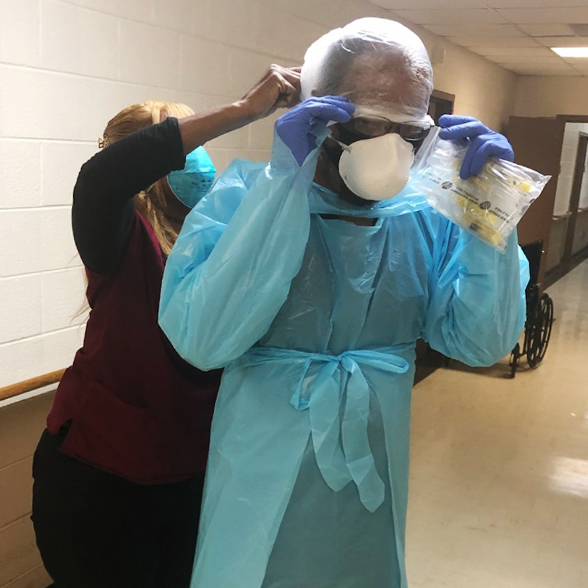Working at home isn& #39;t an option for millions of Americans.
From prisons and meatpacking plants, to grocery stores and buses, @NBCNews identified 7 occupations in which employees are at especially high risk of COVID-19. https://nbcnews.to/2yK6vlR ">https://nbcnews.to/2yK6vlR&q... (1/9) #NBCNewsThreads
From prisons and meatpacking plants, to grocery stores and buses, @NBCNews identified 7 occupations in which employees are at especially high risk of COVID-19. https://nbcnews.to/2yK6vlR ">https://nbcnews.to/2yK6vlR&q... (1/9) #NBCNewsThreads
1. Certified nursing assistants
At least a quarter of the more than 78,000 deaths nationwide are tied to long-term care facilities. Nursing assistants who tend to the elderly in these facilities often lack health insurance, paid sick leave, and protective gear. (2/9)
At least a quarter of the more than 78,000 deaths nationwide are tied to long-term care facilities. Nursing assistants who tend to the elderly in these facilities often lack health insurance, paid sick leave, and protective gear. (2/9)
2. Transit workers
Cities like New Orleans, Seattle, and Chicago have lost workers on the front lines — keeping the city& #39;s buses and subways running during the pandemic. Almost 100 of New York City& #39;s Metropolitan Transit Authority workers have died so far from COVID-19. (3/9)
Cities like New Orleans, Seattle, and Chicago have lost workers on the front lines — keeping the city& #39;s buses and subways running during the pandemic. Almost 100 of New York City& #39;s Metropolitan Transit Authority workers have died so far from COVID-19. (3/9)
3. Janitors
Those who disinfect floors and tidy up rooms in hospitals say they were among the last to get masks when protective equipment is in short supply.
"Nobody gives us all the information when something happens," a janitor at a Chicago hospital says. (4/9)
Those who disinfect floors and tidy up rooms in hospitals say they were among the last to get masks when protective equipment is in short supply.
"Nobody gives us all the information when something happens," a janitor at a Chicago hospital says. (4/9)
4. Meatpackers
Nearly 5,000 workers in meat and poultry facilities have tested positive for COVID-19, causing several plants to temporarily close. Over 80% of workers who butcher, process and package meat in the U.S. are black or Latino. (5/9)
Nearly 5,000 workers in meat and poultry facilities have tested positive for COVID-19, causing several plants to temporarily close. Over 80% of workers who butcher, process and package meat in the U.S. are black or Latino. (5/9)
5. Emergency responders
At one point, about half of New York& #39;s 4,200 emergency medical service workers were out sick.
"I have members who sleep in their cars because they don& #39;t want to go home," says Anthony Almojera, a paramedic with the FDNY. (6/9)
At one point, about half of New York& #39;s 4,200 emergency medical service workers were out sick.
"I have members who sleep in their cars because they don& #39;t want to go home," says Anthony Almojera, a paramedic with the FDNY. (6/9)
6. Farmworkers
Farmworkers often live in communal housing, sit close together on vans and buses to get to fields, and have limited access to health care. Half are undocumented, according to union estimates, making them ineligible for unemployment or stimulus programs. (7/9)
Farmworkers often live in communal housing, sit close together on vans and buses to get to fields, and have limited access to health care. Half are undocumented, according to union estimates, making them ineligible for unemployment or stimulus programs. (7/9)
7. Corrections officers
Last week, more than 1,200 staff members and prisoners at a Tennessee prison tested positive for the coronavirus. In Ohio, more than 2,000 prisoners and 175 staff members at the Marion Correctional Institution have contracted COVID-19. (8/9)
Last week, more than 1,200 staff members and prisoners at a Tennessee prison tested positive for the coronavirus. In Ohio, more than 2,000 prisoners and 175 staff members at the Marion Correctional Institution have contracted COVID-19. (8/9)
According to the Center for Economic and Policy Research, "essential" jobs are disproportionately held by women, immigrants and people of color.
"We& #39;re just creating more of a divide in our society," says Dr. Marissa Baker, a professor at the University of Washington. (9/9)
"We& #39;re just creating more of a divide in our society," says Dr. Marissa Baker, a professor at the University of Washington. (9/9)

 Read on Twitter
Read on Twitter


